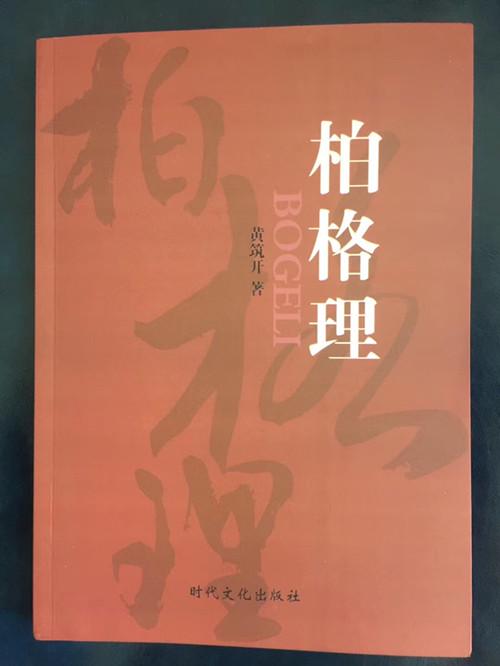In the first half of the 20th century, Shimenkan, shone brilliantly in language, culture, education and sports, rapidly becoming "the highest area in Miao culture in southwestern China". The person who brought such tremendous change was a British missionary, Samuel Pollard.
Since 1905 when Samuel Pollard came to Shimenkan, Weining, Guizhou province, he had stayed in Miao areas until his death. During that time, the missionary work was extremely difficult due to the local geographical and cultural environment. However, he stuck to his mission out of love for God and souls.
Huang Zhukai, a writer from Guizhou, a month ago wrote a novel entitled "Bogeli" (Samuel Pollard) about this great missionary.
Huang said a friend who wrote books about Samuel Pollard invited him to write a novel about Pollard, so he started to write. "Then I just wanted to write a screenplay because there has been no movie about Pollard." Writing for some while, he planned to write a novel because it was unlikely to make it into a movie.
There were many books about Pollard, but his book was the only one giving a detailed account of Pollard's life, said Huang.
After the novel was released, the Christian Times, an Chinese online Christian newspaper, invited Huang to share his writing experience.
Christian Times: This book really has a very detailed account of Samuel Pollard's experience in China. How long did you collect and reorganize the large amount of detailed data ?
Huang Zhukai: The difference between this book and other biographies lies in the fact that it is a fictional account that needs a story, detail description and portrayal. But it needs not be out of touch with reality just because it is a novel. It needs authenticity, so I did much work in data collection.
I read all the books relevant to him written by friends and did material research on the Internet. Then I went to Shimenkan, interviewed some locals, and compiled the fragmented material into the book. After all, it has been around 100 years since Pollard's time. There is a gap between the language, living habits, and environment of that time and the present.
It is very difficult to present the reality of that era. For example, I collected material about some characters and events, but I needed to display the characteristics and deeds of each of them through the text. At the same time, I needed to consider the differences of each person, the difference between the language of the Miao ethnic group and the Yi people, the difference between officials and civilians, etc. Just starting to write I had no idea what to write and was it was very painful.
Christian Times: According to your sharing, I think the process must have been long and tough. What driving forces made you insist on writing it since you were not a Christian ?
Huang Zhukai: I had a simple idea that there was no novel about the missionary. Generally, we read his biographies and stories. There is the feature of a novel that the content can be fictional, but cannot be so fictional that the whole event is fake. Based on facts, it can be a bit fictional in following the plot. To link some historical figures, I used some fictional stories so that the characters and historical events could be enriched, specific, impressive, and touching.
At the beginning of the writing, I did not have a goal. I was moved by Pollard when collecting the material about him and believed his spirit was worthy of publicity. So at the time, I was actually not in a good condition, but in order to make the whole novel concrete, detailed and perfect, I went to Shimenkan several times being sick. I was determined, I had to finish this novel. After I finished writing it, I felt no regrets.
Christian Times: What aspects touched you when collecting Pollard's materials or writing this novel?
Huang Zhukai: In fact, I really wanted to say that Pollard, as a foreigner, traveled a long way to China to preach and stayed in spite of trials and difficulties in the environment at that time is very moving. At that time, the living conditions in Guizhou were very difficult, especially in Shimenkan, Weining. The conditions were extremely difficult.
Pollard left the affluent British environment to arrive in Zhaotong and came to Shimenkan. He stayed there the whole time. No matter how hard it was, he did not hold back. That was difficult for a Chinese to do. Moreover, he stayed in Alpine and extremely poor areas for so many years, did many things beneficial to the local people, and completely changed an ethnic group. These touched me very deeply. In fact, before that, I also thought about having a faith. At that time, I also chose between several religions.
I think that a person should have a faith because it can support oneself through difficult times and help to accomplish something worthwhile. However, which religion should I believe in? There is no definitive answer in my heart. Until then I found myself interested in Christianity the most. I liked the Bible's words and the doctrines of Christianity. Having been influenced by Pollard when I wrote the book, I regarded Christianity as very good, so I chose to firmly believe in Christ. I actually had strong convictions because of writing the book about Pollard. Now my family has followed me in also having faith.
Christian Times: You wrote the book and therefore should know a lot about Pollard’s life. What do you think from Pollard’s spirit is worth learning and imitating? What encouragement and reference can he give to current Christians?
Huang Zhukai: Pollard's selfless, self-sacrificing spirit and great love for the Miao people are very touching. We Christians should follow him as an example to do some good things that we are able. His love is not from himself, but really comes from God. He completely loved those who he did not know, no matter how nice or hateful the other person was to him. He could love them all. This was really not easy .
Hearing things about Pollard, those who don't know him may just learn that he was a missionary. But after reading his life story, people will be touched by him. His spirit can impact others. Many people begin to know and believe in Christianity because of a missionary's story. Isn't that how it was for me? I had no faith. After writing this book, I believed in Christianity because of the deeds and spirit of Pollard. I never met Pollard and I never experienced his deeds personally. I was just touched by reading his history. Didn't those people who were personally served by him think so? Therefore, I feel that we Christians must learn from Pollard's selfless dedication and sacrifice. This is also the mark of a Christian and can give witness to our God.
Editor's postscript:
When I received the book "Samuel Pollard", I immediately read it. There was an amazing instance that took place that was written about in the book: Pollard went to find a chieftain called Rehei. Rehei intended to let his sister Relan marry him because at that time, it was normal for men to have many wives. Relan also fell in love with Pollard because of her brother's intention. Regardless of Pollard's refusal and hindrance, she insisted on coming to his home with Pollard.
Pollard was married, but his wife gently embraced the "uninvited" Relan and treated her with kindness. Although Relan always hounded Pollard and stayed with the couple in a room, she did not talk and refused to go away. Later Rehei came to find her and take her back. When I read about this instance, I couldn't help but secretly applaud Rehei. I thought that this annoyance would be taken care of by her brother. However, Pollard ran out to stop Rehei. He said to him: "If she doesn't want to, you can't treat her like this."
Rehei did not understand it and asked: "Even if she is pestering you here?" Pollard said: "You can't violate her will. You can leave her here and we will teach her to read and reason. Once educated, she will change herself and do better." Of course, in the end, Relan stayed. She also became the "educated" person "who could do better".
My heart was touched. From my point of view, the unilateral entanglement of Relan was very annoying, but Pollard never gave her up. Perhaps this was because the “flame” had not been extinguished even if he was in difficulty. The flame within Pollard came from God, and warmed and illuminated everyone around him.
- Translated by Karen Luo













